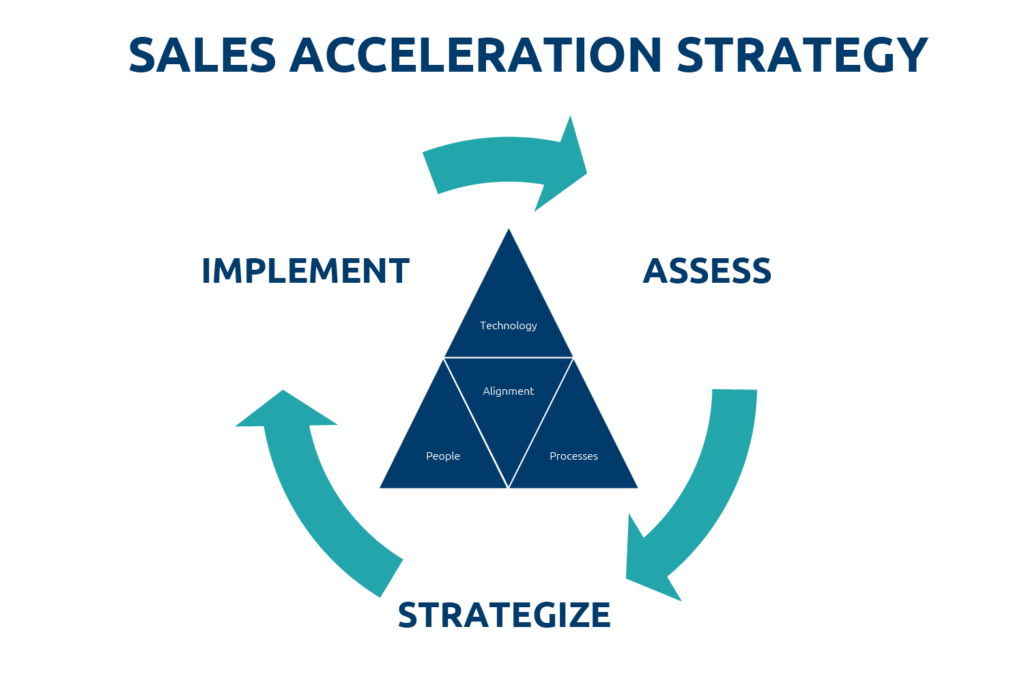The journey from prospect to customer is much like any road trip: long, winding, and filled with surprises.
Faced with a difficult path ahead, it is tempting for organisations to hit the brakes and proceed slowly and cautiously into customer engagements. But that’s the surest way to ensure your competition passes you.
Instead, you’ve got to accelerate sales by learning the ins and outs of your revenue engine so you know exactly how far and how fast you can push it. This guide details everything you need to do just that.
Let’s put the pedal to the metal — it’s time to accelerate your sales.
What Is Sales Acceleration?
Sales acceleration refers to the means by which an organisation may refine its sales processes and tools in order to increase the efficiency and effectiveness of its sales strategy. Ultimately, this means that prospects move seamlessly through your sales funnel, ensuring that you consistently achieve revenue targets.
| Sales Without a Sales Acceleration Strategy | Sales With a Sales Acceleration Strategy |
|---|---|
| Guess-and-check approach to growth | Defined strategy and best practices continuously grow sales |
| Confusion around sales processes and priorities | Processes are clearly defined and easily referenced by reps |
| Product-based sales techniques | Value-based sales techniques |
| Go-to-market teams work in silos and rarely communicate | Go-to-market teams collaborate continuously to drive outcomes |
| Static relationship with market, slow to adapt | Nimbly adapts to shifts in market |
Your sales acceleration strategy should touch all aspects of your go-to-market approach. It can be helpful to think of it as a framework for how marketing, sales, sales operations, and sales enablement can collaborate together to increase revenue. As these teams interact, they should be asking themselves, “Is what I am doing streamlining sales?” If the answer to that question isn’t clear, it’s a good indication that will complicate, rather than accelerate, your pipeline.
Do You Need a Sales Acceleration Team?
If sales acceleration is a top priority for your business — and it should be — then dedicated sales headcount is the first step to making sure your efforts succeed.
While you can create a new sales acceleration team, it’s recommended that you instead direct resources to your existing sales enablement function. Working at the intersection of sales and marketing, your sales enablement team will likely have the context, structure, and experience necessary to successfully drive sales acceleration strategies.
Learn more about sales enablement team roles and responsibilities with this guide.
How Do You Increase Revenue?
Simply put, the only way you can increase revenue is to sell more. Of course, most companies are already trying to do this in some capacity. So why isn’t every business breaking revenue records every day?
The sad reality is that revenue growth is more often than not a game of inches. Incremental process changes will allow you to streamline your go-to-market strategy and more efficiently and effectively engage customers. Over time, the impact of these efforts will compound, and that’s when explosive revenue growth happens: when every cylinder of your revenue engine is firing.
How Do You Accelerate Growth in Sales?
If sales leaders could wave their hands and make B2B sales as simple as checking out at the grocery store, they would. Unfortunately, modern leaders are faced with an increasingly complex sales landscape. Purchasing groups are larger. Buyers are more demanding. What’s a sales leader to do?
The key to accelerating sales is to make it an always-on part of your go-to-market strategy. After all, if your market is continuously changing, why shouldn’t you? There are three steps to get started.

1. Assess
First, do a deep dive into your data and analytics. Do you know what is working for your sales team? Do you know what is not? Your sales technology should help you uncover the answer to these problems, but qualitative research is also important here. Take these questions to your reps, your marketing teams, your sales ops teams, and your enablement teams. Often, the biggest road bumps boil down to how teams collaborate with one another — and you won’t know where you’ve gone astray unless you ask.
2. Strategise
Next, define what needs to change to remove blockers in your strategy. Here, it’s important not just to meet and discuss what needs to be done, but to document exactly how you will do it. Though it may sound stodgy, a written strategy ensures that all parties involved know which actions they need to take to make these changes happen — and that you can hold them accountable if they don’t.
3. Implement
Finally, it’s time to implement your strategy. Remember that this is not a one-and-done process but an ongoing optimisation project. Thus, as you deploy your sales acceleration strategy, consider how you will track and measure progress against your goals. Will you review the qualitative and quantitative data after one quarter or three? As a best practice, define what these expectations are before you roll out changes to your teams.
What Are Sales Acceleration Tools?
Technology plays a critical role in accelerating sales. Empowering your go-to-market teams with the right tools allows you to efficiently and effectively put your sales acceleration strategy into place — as well as measure your progress towards your goals.
The core tech stack of most successful sales teams comprises the following tools:
- CRM: Customer relationship management platforms, or CRMs, allow you to track and manage interactions with buyers as they move from prospects to valued customers.
- Sales engagement platforms: These platforms allow businesses to quickly scale sales output by templatising and optimising customer-facing interactions.
- Communication platforms: Email clients, web conferencing, and chat platforms all ensure that your teams are communicating regularly, reducing confusion and increasing alignment.
- Sales enablement platforms: Enablement platforms empower teams with the content, guidance, and training they need to elevate every customer conversation.
- Business intelligence platforms: These platforms inform your business strategy by displaying large volumes of data in easily consumable reports.
You can learn more about these tools and which ones to purchase in our sales tools guide.
Importantly, remember that what you don’t purchase is just as important as what you do. As you evaluate the different applications available to you, don’t be swayed by flashy marketing or empty promises. Keep a high standard for tools that drive business impact.
6 Best Practices for Accelerating Sales
1. Align go-to-market teams
The first step in any major strategy shift is to align your sales, marketing, and enablement functions. Clarity around roles, responsibilities, and how and when these teams should collaborate will allow you to seamlessly execute sales acceleration initiatives.
The key to alignment is to leave your ego at the meeting room door. As companies scale, personal biases can quickly become professional complications as teams jostle for ownership over high-impact initiatives. By removing ego, or the desire to promote oneself, from the conversation, you’ll quickly find that you are able to secure alignment that lasts. Additionally, don’t shy away from tools like a sales enablement platform, which acts as a forcing function to get teams singing off the same hymn sheet. These technologies allow leaders to make decisions based on data, not ego-driven opinions.
2. Bring sales expertise into your sales enablement platform
How do you reps know which actions to take and when to take them? How should they frame customer conversations? What approach should they use to move buyers towards purchase? The answers to these questions and more are derived from your sales methodology.
Too often, however, these essential materials are siloed off from your reps’ daily workflows. As a result, reps fail to adopt the sales approach your methodology outlines and instead rely on their own guess-and-check strategies. This may yield some success, but it certainly won’t accelerate sales. Instead, ensure that your methodology is surfaced in your sales enablement platform so reps can have deal-winning expertise at their fingertips at all times.
3. Coach your sales coaches
Let’s say you’ve developed a new sales acceleration strategy and have prepped your sales enablement tool to deploy it. How do you ensure it lands in the field? By empowering your sales managers to coach reps on it.
Sales managers bridge the gap between sales leadership and reps and turn lofty visions into reality. In order for sales managers to cross this chasm effectively, however, you must coach them on how to effectively communicate and reinforce new behaviours. Just as you would for any sales rep, be sure to provide coaches with training, content, and guidance on which actions they should take to guide and inspect rep performance.
4. Inform your content strategy with data
Every revenue leader knows that content is critical to sales success. Where they struggle is in knowing which of their sales assets are elevating customer conversations — and which aren’t.
In order to leverage the power of content to accelerate sales, revenue leaders require insight into both internal and external content performance. A heatmap, or similar approach, can help you glean these insights and understand where to invest your efforts. And, in fact, you can get a head start with our content mapping template.
5. Boost sales productivity
Sales acceleration means doing more faster. But that’s not always possible if reps are bogged down by internal processes and tasks. If you really want to move the needle on revenue growth, you’ve got to boost individual rep productivity first.
This can be achieved by examining how reps are spending their time. Chances are that precious hours are being wasted on administrative tasks or other non-selling activities. To unlock more hours for your reps, think about how you can outsource, automate, or eliminate activities that don’t directly impact customers. For instance, if reps struggle to find content, invest in a sales enablement platform. If reps are losing hours to internal meetings, reevaluate your sales process. This exercise will help you remove time sinks from reps’ workdays and boost output.
6. Invest in a unified sales enablement platform
As we mentioned earlier, sales enablement and sales acceleration are closely linked. The “how” of your sales acceleration strategy will largely depend on your approach to coaching, training, and equipping your sales reps — actions that should be taken directly within your sales enablement platform for maximum impact.
That means that organisations committed to sales acceleration should invest in a unified enablement platform that seamlessly delivers content management, training and coaching, and data and analytics all in one solution.
Rev Up Your Revenue Engine
Supercharged sales are in your future: with the right tools, approach, and mindset, sales acceleration is all but guaranteed.
Need an extra boost? Take your strategy one step further with our guide to optimising your revenue engine.




